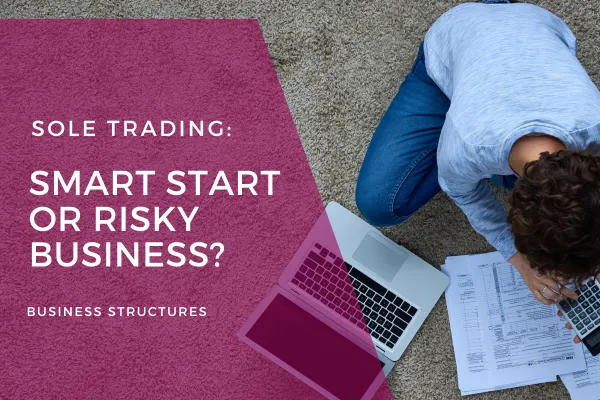
Sole Trading: Smart Start or Risky Business?
Starting a business is an adventure that many embark on, but often with trepidation due to the bleak statistics around business survival. However, with the right approach, these stats can be defied.
Many entrepreneurs begin as sole traders due to its simplicity and cost-effectiveness. Yet, this choice may inadvertently set limits on your business aspirations.
The Perils of Sole Trading
A sole trader structure offers no distinction between personal and business assets. This unlimited liability means personal belongings could be at risk if your business faces legal issues. Imagine jeopardising your home, car, or savings to settle business debts—a situation no entrepreneur wants.
Moreover, as a sole trader, profits become personal income and are taxed at individual rates. While manageable on a modest income, this could lead to hefty tax bills as earnings rise.
Tax Implications and Risk Exposure
Consider this: if your sole trader business profits $100k annually, you may end up paying more tax than necessary. And while freelancing might seem fit for sole trading, the risks can outweigh the benefits, especially in professions with high liability risks, like electricians or mechanics.
A Cautionary Tale
Take the tragic example of a young café owner. A sole trader, she suffered a severe injury, resulting in lost livelihood and insurmountable debts. Had she opted for a company structure, access to workers' compensation could have cushioned her fall, protecting her personal assets.
Essential Questions for Aspiring Sole Traders
Before deciding on a sole trader structure, consider:
What business vision do you have?
Are you seeking a self-employed job or a scalable business?
Is hiring a part of your growth plan?
Do you anticipate substantial income or profit?
Are you prepared to risk personal assets for business debts?
Does your startup require significant investment?
If you've nodded to any, it's time to explore robust structures like companies or family trusts.
Sole Trader or Not?
A sole trader status might suffice for low-risk, small-scale endeavours. But if your sights are set on expansive growth, employee hiring, and substantial profit, think bigger and safer. Dive into our "business structures" series to learn more about the alternatives that safeguard your personal assets and pave the way for success.




